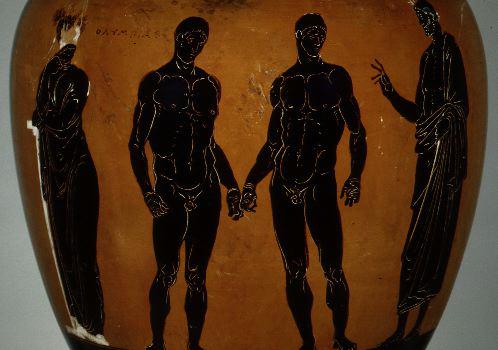





Athletes' Stories
- Milo of Kroton
- Theagenes of Thasos
- Diagoras of Rhodes
- Polydamas of Skotoussa
- Melankomas of Caria
Diagoras of Rhodes
- Boxer
- Victor in the 79th Olympiad, 464 BCE.
| And now, with the music of flute and lyre alike I have come to land with Diagoras, singing the sea-child of Aphrodite and bride of Helios, Rhodes, so that I may praise this straight-fighting, tremendous man who had himself crowned beside the Alpheus and near Castalia, as a recompense for his boxing... Pindar, Olympian 7, lines 13-17 |
The boxer Diagoras of Rhodes embodied every quality of the noble ancient athlete. Immortalized in one of the most famous odes of the poet Pindar, Diagoras was victorious in not only the Olympic games, but in every other major Greek athlethic festival as well. The extent and number of his triumphs certainly contributed to his fame, but the virtuous character of Diagoras was as important to the ancient Greeks as his success as a boxer.
We know that Diagoras' family was of the noble, ruling class on Rhodes, and the Rhodians claimed that the boxer himself was the son of the god Hermes. Such legends were a common means of explaining how mortal men could perform "super-human" athletic achivements.

Side B: boxers.
Photograph by Maria Daniels, courtesy of The University Museums, University of Mississippi
In his Ode for Diagoras, Olympian 7, Pindar praises the boxer as a "fair-fighter" and a "gigantic" man. Diagoras also "walks a straight course on a road that hates arrogance." In addition to his Olympic victory, Diagoras won four times at the Isthmian games, twice at Nemea, and at other games held in his native Rhodes, Athens, and elsewhere throughout the Greek world. We have no exact record of his career, but it is clear that Diagoras was a legend in his own time.

Side B: boxing scene with four figures.
Photograph by Maria Daniels, courtesy of The University of Pennsylvania Museum of Archaeology and Anthropology
Moreover, Diagoras lived to witness the Olympic victories of his two sons Damagetos and Akousilaos. At the 83rd Olympiad in 448 BCE, Damagetos won the second of his two prizes for the pankration, and Akousilaos won the boxing victory. Then, the sons carried their father on their shoulders while the adoring crowd showered them with flowers and congratulated Diagoras on his sons. Another of his sons, Dorieus, won no less than three successive Olympic titles in the pankration, along with eight Isthmian victories and seven at Nemea. Two of the sons of Diagoras' daughters were also Olympic boxing champions.

Side B: two boxers, official, and Olympias.
Photograph by Maria Daniels, courtesy of Harvard University Art Museums
Olympia crowned three generations of Diagoras' family, adding to the fame that the boxer won in his own right and no doubt fueling other legends of the immortal ancestry of the Diagoras family. Even baseball's Griffey and Ripken families fall a generation short of imitating the achievements of Diagoras, his sons, and grandsons.
To read more about these topics, see Further Resources.
This exhibit is a subset of materials from the Perseus Project database and is copyrighted. Please send us your comments.